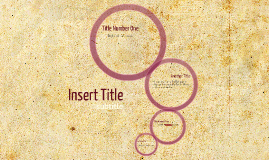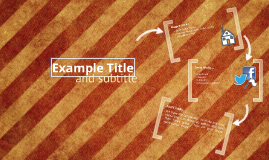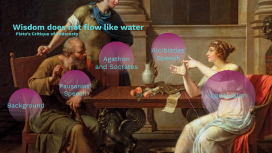Raven Presentation
Transcript: Personification is giving inanimate, nonliving objects life-like or human characteristics The Raven Summary Stanzas 14-17 Chaos is personified into Tempter to explain the Raven's sudden, menacing, and purposeful presence. The narrator's apprehension is personified into Horror to show he is not merely controlled by his emotions but some other, sinister force. Personification Introduction Edgar Allan Poe, a renowned 19th century author, is considered to be one of the most unique writers to ever grace literature. Poe dove into the deepest realms of darkness and gloom, a style that heavily contrasted from other writers at the time. Poe's style of negativity perfectly reflects his own life, one that was void of happiness. Poe was well acquainted with death as he experienced the passing of almost every one he knew, tearing his heart open, with the blood dripping onto his poems. One of the most known is "The Raven." What is it? Examples of Personification "Then, methought, the air grew denser, perfumed from an unseen censer Swung by Seraphim whose foot-falls tinkled on the tufted floor. “Wretch,” I cried, “thy God hath lent thee—by these angels he hath sent thee Respite—respite and nepenthe from thy memories of Lenore; Quaff, oh quaff this kind nepenthe and forget this lost Lenore!” Quoth the Raven “Nevermore.” “Prophet!” said I, “thing of evil!—prophet still, if bird or devil!— Whether Tempter sent, or whether tempest tossed thee here ashore, Desolate yet all undaunted, on this desert land enchanted— On this home by Horror haunted—tell me truly, I implore— Is there—is there balm in Gilead?—tell me—tell me, I implore!” Quoth the Raven “Nevermore.” “Prophet!” said I, “thing of evil!—prophet still, if bird or devil! By that Heaven that bends above us—by that God we both adore— Tell this soul with sorrow laden if, within the distant Aidenn, It shall clasp a sainted maiden whom the angels name Lenore— Clasp a rare and radiant maiden whom the angels name Lenore.” Quoth the Raven "Nevermore."" All of us will die someday... The story begins in the home of a narrator, who is reading books while suffering grief for his dead Lenore when he hears a knocking. Eventually, he discovers the sound resonated from a Raven that flew onto a bust. Strangely, the Raven is able to speak the word "Nevermore." Continuously, it responds "Nevermore" every time the narrator inquires for the cure of his misery. The narrator, in frustration, demands the Raven takes its leave, but it stays, along with the narrator's despondency. Atmosphere of the Raven The purpose of for this is to emphasize the sheer desperation and negativity to establish the grief he feels for Lenore. Ironically, personification involves bringing the element of life, yet death is the focused aspect. Possibly, this is to demonstrate the narrator's perplexity and waning sanity. "The Raven" Summary and Analysis by Toby Liu, 5th Period "Whether Tempter sent, or whether tempest tossed thee here ashore... On this home by Horror haunted—tell me truly, I implore..." An overwhelming amount of darkness and hopelessness is present in "The Raven. " The death of Lenore causing suffering and despair is immediately recognized as a negative element. Darkness overtakes positivity. The narrator's hope and sanity is crushed when the Raven refutes the provision of any relief for death's painful sting. Stanzas 14-17 demonstrate this. (Lines 2-4, Stanza 16)

















